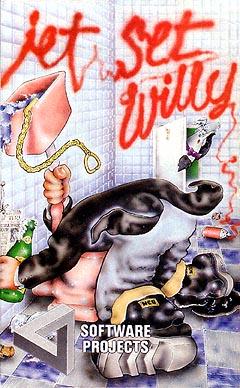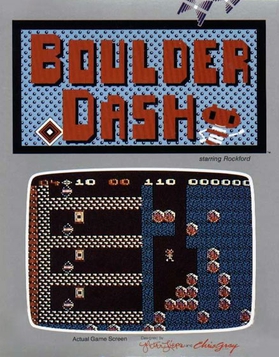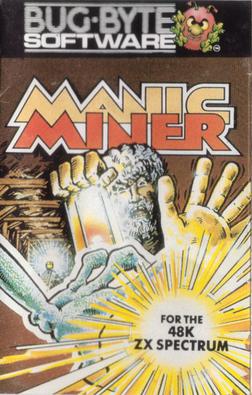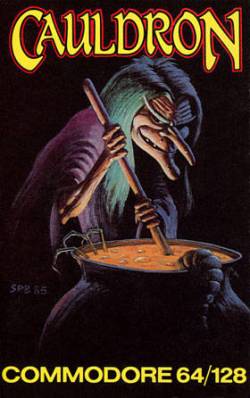Related Research Articles

The Amstrad CPC is a series of 8-bit home computers produced by Amstrad between 1984 and 1990. It was designed to compete in the mid-1980s home computer market dominated by the Commodore 64 and the ZX Spectrum, where it successfully established itself primarily in the United Kingdom, France, Spain, and the German-speaking parts of Europe.
Miner Willy is the protagonist in a series of platform games for the ZX Spectrum, MSX, Amstrad CPC and the Commodore 64 home computers. The first two games - Manic Miner and Jet Set Willy were written by Matthew Smith during the early 1980s.

Jet Set Willy is a platform video game written by Matthew Smith for the ZX Spectrum home computer. It was published in 1984 by Software Projects and ported to most home computers of the time.

Boulder Dash is a maze-based puzzle video game released in 1984 by First Star Software for Atari 8-bit computers. It was created by Canadian developers Peter Liepa and Chris Gray. The player controls Rockford, who tunnels through dirt to collect diamonds. Boulders and other objects remain fixed until the dirt beneath them is removed, then they fall and become a hazard. Puzzles are designed around collecting diamonds without being crushed and exploiting the interactions between objects. The game's name is a pun on balderdash.

Manic Miner is a platform game written for the ZX Spectrum by Matthew Smith. It was published by Bug-Byte in 1983, then later the same year by Software Projects. The first game in the Miner Willy series, the design was inspired by Miner 2049er (1982) for the Atari 8-bit computers. Retro Gamer called Manic Miner one of the most influential platform games of all time, and it has been ported to numerous home computers, video game consoles, and mobile phones.

Matthew Smith is a British computer game programmer. He created the games Manic Miner and Jet Set Willy for the ZX Spectrum, released in 1983 and 1984 respectively. Smith left the games industry in 1988 and later moved to the Netherlands. He has since returned to the UK and has worked on some games as well as appearing at conventions and in documentaries.

CRL Group plc was a British video game development and publishing company. Originally CRL stood for "Computer Rentals Limited". It was based in King's Yard, London and run by Clem Chambers.

Jet Set Willy II: The Final Frontier is a platform game released 1985 by Software Projects as the Amstrad CPC port of Jet Set Willy. It was then rebranded as the sequel and ported to other home computers. Jet Set Willy II was developed by Derrick P. Rowson and Steve Wetherill rather than Jet Set Willy programmer Matthew Smith and is an expansion of the original game, rather than an entirely new one.

Amstrad Computer User was the official magazine for the Amstrad CPC series of 8-bit home computers. This monthly publication, usually referred to as ACU by its readers, concentrated more on the hardware and technical side of the Amstrad range, although it had a small dedicated games section as well.
Amsoft was a wholly owned subsidiary of Amstrad, PLC, founded in 1984 and re-integrated with its parent company in 1989. Its purpose was to provide an initial infrastructure of software and services for users of Amstrad's range of home computers, the Amstrad CPC and, from 1986, the ZX Spectrum. Many people's first contact with software on an Amstrad home computer would have been an Amsoft title, as several titles were included in the sales bundles.
Software Projects was a computer game development company which was started by Manic Miner developer Matthew Smith, Alan Maton and Colin Roach. After leaving Bug-Byte as a freelance developer, Smith was able to take the rights to his recently developed Manic Miner game with him, due to an oversight in his freelance contract. Software Projects was then able to market and publish the ZX Spectrum hit game separately from Bug-Byte. Their logo was a Penrose triangle.

Artic Computing was a software development company based in Brandesburton, England from 1980 to 1986. The company's first games were for the Sinclair ZX81 home computer, but they expanded and were also responsible for various ZX Spectrum, Commodore 64, BBC Micro, Acorn Electron and Amstrad CPC computer games. The company was set up by Richard Turner and Chris Thornton. Charles Cecil, who later founded Revolution Software, joined the company shortly after it was founded, writing Adventures B through D. Developer Jon Ritman produced a number of ZX81 and Spectrum games for Artic before moving to Ocean Software.

Cauldron is a video game developed and published by British developer Palace Software in 1985 for the ZX Spectrum, Commodore 64, and Amstrad CPC home computers. It contains both platform game and horizontally scrolling shooter sections. Players control a witch who aims to become the "Witch Queen" by defeating an enemy called the "Pumpking".
Quicksilva was a British games software publisher active during the early 1980s.

Kong Strikes Back! is a 1984 platform video game published by Ocean Software in 1984 for the Amstrad CPC, Commodore 64 and ZX Spectrum. While its predecessor, Kong, is a Donkey Kong clone, Kong Strikes Back! is a clone of Mr. Do's Wild Ride with Donkey Kong-inspired graphics.
Alligata Software Ltd. was a computer games developer and publisher based in Sheffield in the UK in the 1980s.

Bugaboo (The Flea), later published in Spain as La Pulga, is a video game written by the Spanish programming duo Paco Portalo and Paco Suarez for the ZX Spectrum and published by Quicksilva in 1983. It was later released for the Commodore 64 and MSX were produced. The Amstrad CPC port was published under the name Roland in the Caves using the Roland character.

Roland Goes Digging is a 1984 computer game for the Amstrad CPC series of home computers. It was distributed by Amsoft, on cassette tape for CPC 464 and Amstrad's proprietary 3" disk format, for CPC 664 and CPC 6128 users. The game was developed by regular Amsoft contributors Gem Software and featured Amstrad's CPC mascot Roland, who also appears in other games in the Roland series, such as Roland in the Caves, Roland in Time and Roland in Space.

Yogi Bear is a 1987 arcade adventure video game developed by British studio Dalali and published by Piranha Software. It was released in Europe for Amstrad CPC, Commodore 64 (C64), and ZX Spectrum. In the game, Yogi Bear sets out to rescue Boo-Boo after he is captured by a hunter. Yogi Bear received praise for its graphics, but criticism for its controls.
References
- ↑ Sugar, Alan (2010-09-30). What You See Is What You Get. Pan Macmillan. p. 69. ISBN 9780230754737 . Retrieved 10 April 2012.
- ↑ Roland on the Ropes on MobyGames
- ↑ "Free download Fred (aka Roland on the ropes)". Windows Retro Games. Retrieved 10 April 2012.
- ↑ Roland in the Caves on MobyGames
- ↑ Roland Goes Digging on MobyGames
- ↑ Roland in Time on MobyGames
- ↑ "Roland Takes a Running Jump, Amstrad Computer User, November 1985, p.44". Amsoft. Retrieved 5 June 2019.